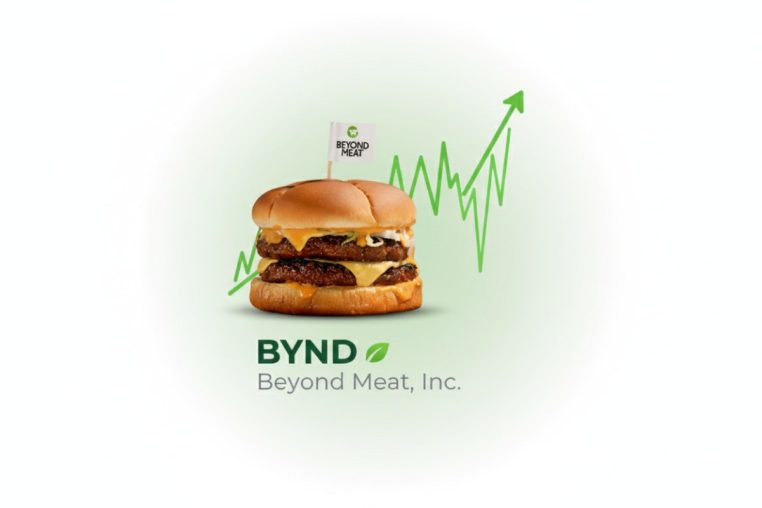Beyond (BYND), Meat was founded in 2009 by Ethan Brown with a bold mission: to change the way we eat by replacing animal-based meat with plant-based protein. Its first big breakthrough came with the launch of the “Beyond Burger” in 2016, which offered a taste-and-texture experience similar to beef but made from plant proteins. The brand rapidly gained traction in grocery stores and restaurants, tapping into rising consumer interest in health, sustainability and animal welfare.
For several years, Beyond Meat rode a wave of optimism. When the company went public in 2019, it became one of the highest-profile launches of the plant-based food sector. However, the journey since then has been anything but smooth.
In recent updates, Beyond Meat is facing serious headwinds. The company reported weaker-than-expected revenues and posted a larger-than-anticipated loss in early 2025. Consumer demand for meat alternatives has softened, with some shoppers favouring lower-cost, conventional meat or fresher solutions. As a result, Beyond Meat is undergoing a strategic transformation.
One of the key new developments: Beyond Meat has secured up to US $100 million in senior secured debt financing to shore up liquidity and fund ongoing innovation. At the same time, the company is expanding retail distribution. In October 2025 it announced that select products would be available in more than 2,000 Walmart stores nationwide — including a new “Beyond Burger 6-Pack,” “Beyond Chicken Pieces” and “Beyond Steak Korean BBQ-Style.”
Simultaneously, Beyond Meat is shifting its product strategy. Via its “Beyond Test Kitchen,” the firm is launching innovation-driven, limited–edition drops of plant-based ground meat and mycelium-derived steak products direct to consumers. It has also signalled a branding evolution, with a push toward simpler labels, fewer ingredients and a growing focus on “cleaner” plant-based options rather than purely replicating traditional meat. Vox
Despite these updates, serious risks remain. Beyond Meat’s longstanding debt and capital-structure pressures have triggered concerns among analysts. Moreover, recent debt-swap announcements sparked a sharp share-price decline and share dilution.
For investors and food-industry watchers, Beyond Meat’s story is no longer just about disruption—it’s now a test of resilience, adaptation and execution. The company’s newest initiatives could chart whether plant-based meat remains a mainstream contender or reverts to niche status. Either way, Beyond Meat’s next chapter may be as interesting as its first.
Beyond Meat’s Meme Stock Moment and What Comes Next
Beyond Meat was once a pioneer of the plant-based food movement. However, in 2025, it found itself in a very different spotlight: the meme-stock arena. The company’s fundamentals were already shaky, with declining sales, mounting debt, and weak consumer demand. Then retail traders on Reddit and other social platforms piled in.
The spark came in October. A major debt-swap deal issued hundreds of millions of new shares. This dilution pushed the share price below $1 in some sessions. Meanwhile, social-media chatter erupted. A Reddit thread titled “MAKE $BYND GREAT AGAIN” began circulating. It aimed to trigger a short-squeeze on Beyond Meat.
For a brief period, the stock shot up dramatically. One report noted a surge of 388% in just two days, from around $0.64 to $2.48 per share. Volume exploded, short interest was high, and the “meme crowd” assumed the driver.
Yet, while hype can move a stock in the short term, the underlying business did not improve. Beyond Meat still faced declining revenues and systemic issues. Analysts cautioned that the rally was likely speculative and unsustainable.
As quickly as the share price popped, it began to retreat. The surge lost steam, and the crash set in. The question became not if it would fall, but when — and by how much.
What This Means for Investors
Investors considering Beyond Meat need to remember that this was a meme-driven event, not a turnaround backed by results. High trading volume and social-media buzz may offer short-term gains, but they do not fix a business model. Debt load, shifting consumer trends, and share dilution remain major concerns.
For short-term traders, the volatility presented opportunities, but also very real risks. For long-term investors, the outlook is weaker unless Beyond Meat can demonstrate operational improvement. Either way, the company’s recent episode highlights how social-media dynamics now influence market moves. It also underscores the difference between hype and fundamentals.

